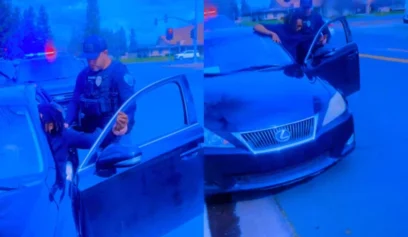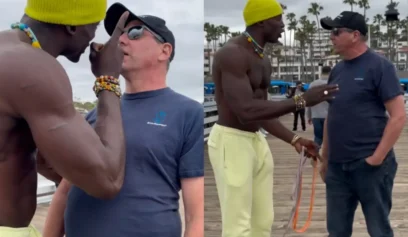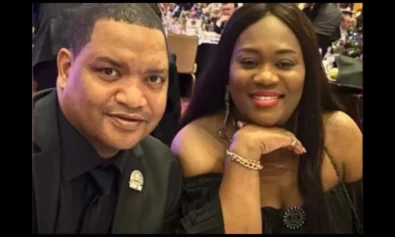A Oregon police agency’s use of a “standard” law enforcement tool to digitally alter a suspect’s booking photo is at the crux of a federal case presented before a judge last week.
There’s nothing subtle about the intricate tattoos covering Tyrone Lamont Allen’s face, the body art buzzed onto his forehead and right cheek. Allen, 50, was suspected in a string of bank and credit robberies across Portland in 2017, however, when his description didn’t match that of the suspect in the stick-up, officers doctored his mugshot.

Tyrone Lamont Allen, who has distinctive facial tattoos, is accused of robbing a number of banks and credit unions in Portland, Oregon, in 2017. (Photo: court exhibit)
Using photo editing software, police covered each of his tattoos after none of the bank tellers reported the suspect as having body ink, Oregon Live reported.
“I basically painted over the tattoos,’’ police forensic criminalist Mark Weber testified in court. “Almost like applying electronic makeup.’’
Allen was ultimately charged in the four robberies after some of the bank tellers, who weren’t informed the man’s photo had been altered, chose him out of a photo lineup of similar-looking suspects.
Defense attorney Mark Ahlemeyer railed against the practice, arguing that the blatant manipulation allowed officers to “rig the outcome” of the lineup. According to Oregon Live, he’s since pressed a judge to dismiss the positive witness IDs of Allen on the grounds that police scrubbed his face of tattoos in a effort to make him more closely resemble their reported suspect.
“This is a very, very slippery slope given the advent of technology,’’ Ahlemeyer told the newspaper. “We don’t know where this may end.’’
The practice of photoshopping suspects’ booking photos has come under criticism, especially by criminal justice advocates who say the act ups the risk of mistaken identity and thus, wrongful charges and convictions. The Innocence Project, an organization that works to free wrongfully-convicted defendants, reports that mistaken witness ID’s account for over half (71 percent) of the more than 360 wrongful convictions in the U.S. that have been overturned, thanks to post-conviction DNA evidence.
Despite this, Assistant U.S. Attorney Paul Maloney defended the officers’ decision to digitally edit Allen’s photo and argued that it was done in effort to make the defendant “blend in,” rather than stand out.
“These procedures were prudent,” said Maloney. They were appropriate.”
The attorney acknowledged Allen’s photo was altered to also “look like the disguises that were on the robber,” who was sporting a baseball cap and a pair of reading glasses. According to a police affidavit, the suspect warned bank staff that he was armed and whispered to one teller that he woulds “blow your brains out” if she didn’t hand over the cash.
If Allen is the man who hit each bank and credit union, investigators said he made off with just over $14,100 in all.
The directive to change the defendant’s photo came from Detective Brett Hawkinson, an 18-year police veteran and lead investigator in the case, according to the paper. A surveillance image of the robber from one of the bank was previously released to the media and showed nary a tattoo on the suspect’s face. After the photo was aired on the news, Hawkinson said he received a tip from two sources who pointed to Allen as the robber.
The detective suspected Allen may have used make up to hide his facial art, and said, then, his goal was “to rule Allen in or out as a suspect and determine whether the sources who contacted police were credible,” Oregon Live reported.
It’s “standard practice among investigators,’’ Hawkinson said of the photo manipulation.
He added: “There are times it has been appropriate to make those small subtle changes. “The main purpose is not to make the suspect stand out.”
The case remains up in the air, however, U.S. District Judge Marco A. Hernandez’s ruling could set a precedent for similar cases on police-best practices in Oregon and elsewhere.
Hernandez has heard both both parties’ arguments and is expected to issue a ruling soon.


